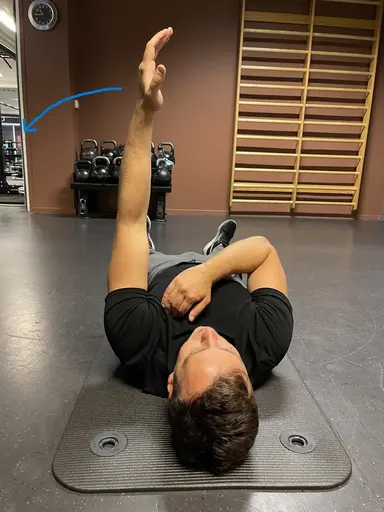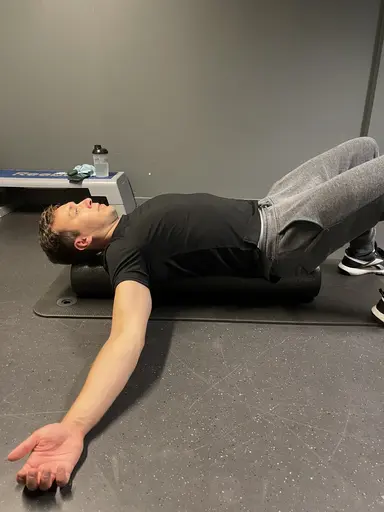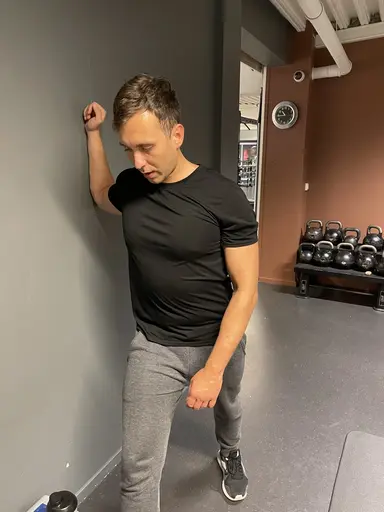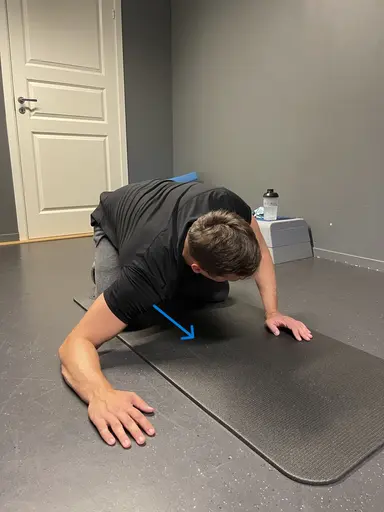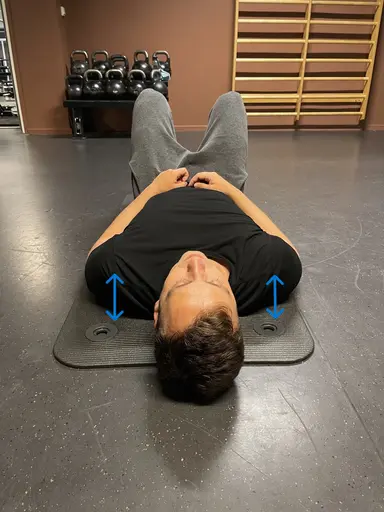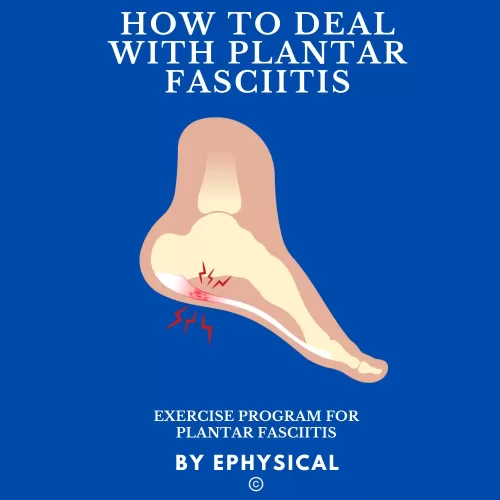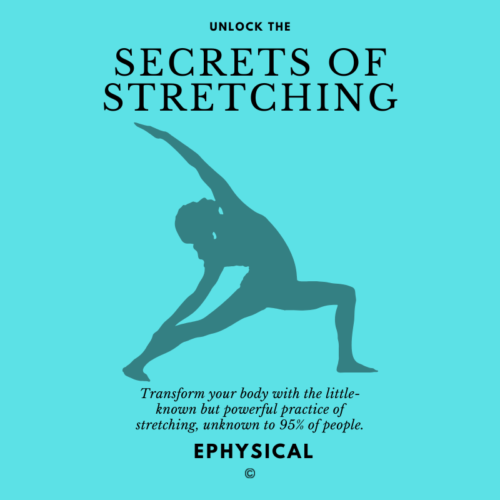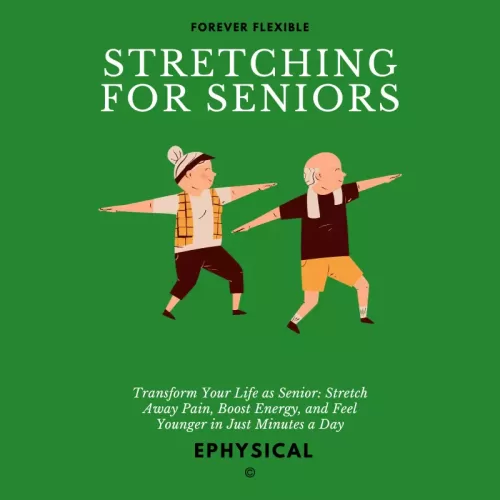Pec Minor Stretch – 7 Most Effective Ways to Stretch Your Chest Muscle
In this article I will show you the best pec minor stretches to reduce tightness in pec minor muscle and improve shoulder mobility.
You will learn:
- How to Release Your Pec Minor
- How to Stretch Pec Minor
- How to track a pec minor tightness
- How Does Tight Pec Minor Affect Shoulder-Blade and Shoulder Joint
And much more.
Pec Minor Release (Before Stretching)
There are two ways for you to release pec minor muscle, active or passive.
I’ll show you both techniques so you can try them and choose the one you like the most.
Active Pec Minor Release
- Lay down on your back, holding the right arm in front of your body
- Place a massage ball or palm of the other hand on a pec minor muscle (just below the shoulder joint on a ribcage)
- Apply gentle pressure on a pec minor muscle and hold
- Then, move your arm away from the midline of your body (abduction) ten times
Passive Pec Minor Release
- Lay down on your stomach, placing the massage ball on a pec minor muscle
- Place your arm slightly to the side (abduction) and lean gently towards yoga ball with upper body
- Then rotate your arm both externally and internally ten times
These release techniques can help you relieve tightness in chest muscles like pec minor and major.
Popularity of Different Stretching Techniques
This pie chart showcases the popularity of different stretching techniques. Static stretching takes the cake with 70% preference, followed by dynamic stretching at 20%, and PNF stretching at 10%. It’s clear that when it comes to stretching, people often opt for the tried-and-true static method.
How to Stretch Your Pectoralis Minor
Key Points When Stretching Chest Muscles:
- Keep your shoulder blades (scapula) retracted and tilted backward.
- Breathe slowly and try to lower the lower part of your ribs.
- Gently advance into the stretch to avoid any shoulder discomfort.
- Hold pectoralis minor passive stretches for 30s.
Pec Minor Stretch with Foam Roller
- Start by lying face-upon the floor with your legs extended.
- Place a foam roller on your spine.
- Extend your arms to side, forming a shape T with body and arms.
- Hold this stretch for 30s while breathing deeply
This is most common pec minor stretch in physical therapy.
Door Stretch for Pec Minor
- Stand facing a doorway or a sturdy vertical surface like a wall.
- Raise your arm to a 90-degree angle and place your forearm and hand on the door-frame.
- Step forward with one foot to create a slight forward lean while keeping your back straight.
- You should feel a gentle stretch across your chest and pec minor.
- Hold this position for 30 seconds while taking deep breaths.
- Repeat the stretch on the other side.
Corner Stretch for Pec Minor
- Find a corner in a room where two walls meet.
- Stand with your feet shoulder-width apart and face the corner.
- Place your forearms and hands on each wall at shoulder height.
- Lean your body forward into the corner, allowing your chest and shoulders to open up.
- Feel the stretch in your chest and pec minor.
- Hold this position for 30 seconds while breathing deeply.
- Gently step back to release the stretch.
Floor Pec Minor Stretch
- Start by lying down on your stomach
- Place one arm to 90/90 position in shoulder and elbow (shoulder abduction 90 degree and elbow flexion 90 degree)
- With help of other hand, push your upper body against the floor
- Hold this stretch for 30s
Forward Dip Lean Stretch for Pec Minor
- Start from a kneeling stance
- Place two chairs parallel and place a palm of hands on them
- While bending the elbows, lean forward with your upper body, increasing the stretch of a pec minor muscle
- Hold this stretch for 30s
How to Measure Pec Minor Tightness
In order to see if pec minor stretches are effective, you should measure the tightness in this muscle group.
Here is how to do it:
- Lay down on your back
- Relax with your shoulders
- Measure the distance between shoulders and floor
- Check both sides
After stretching for a few weeks, you can track your progress by repeating this test.
The Effects of a Tight Pec Minor Muscle
Tightness in this muscle will contribute to scapular abduction and forward tilt.
That leads to an unfavorable position of the scapula (shoulder blade) when lifting shoulders above the head.
Specifically, the space between the acromion and head of a shoulder bone (humerus) is reduced, making the rotator cuff muscles more prone to injuries.
That’s why you should perform pec minor stretching exercises.
Muscle Groups Targeted in Chest Stretches
When stretching the chest, it’s not just the pec minor that gets some love. This bar chart reveals that 40% of the focus is on the pec minor, followed closely by the pec major at 35%. Triceps and deltoids also get some attention but to a lesser extent.
What Yoga Poses Stretch Pec Minor Muscle
The most popular yoga poses that stretch the pec minor muscle are supported fish pose with a bolster and a scorpion pose.
*Find an experienced yoga instructor before doing any advanced yoga poses (scorpion pose).
Benefits of Pec Minor Stretching
Last but not least, let’s talk benefits. The donut chart illustrates that 50% of people stretch their pec minor for increased flexibility. Pain relief and posture improvement follow, making up 30% and 15% respectively. A small percentage also stretch for strength.
Connection Between Pec Minor Flexibility and Lower Trapezius
A tightness in pectoralis muscles can influence the middle and lower trapezius in a negative way because both the trapezius and pec minor attaches to the shoulder blade bone (scapula).
Tight pec minor contributes to scapular abduction (moving the shoulder blade away from the midline of your body) thus placing the middle and lower trapezius in an elongated position.
As a result, the trapezius muscle can become less functional = weak, and constantly in a slightly elongated position.
What Other Muscles Should I Stretch Beside Pec Minor to Prevent Rounded Shoulders and Forward Scapular Tilt?
Usually, the tightness in a chest muscles is associated with a rounded shoulders posture.
But, the chest muscles are not the only muscles to contribute to this posture.
Lats and triceps brachi are muscles which can contribute to rounded shoulders posture also, so you should definitely find some good stretches for these two muscles.

